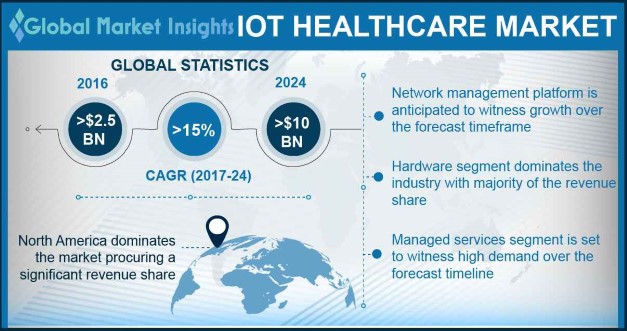North America Internet of Things (IoT) in healthcare market to witness remarkable growth over 2017-2024, Telemedicine sector to drive the application landscape
Publisher : Fractovia | Published Date : 2017-10-16Request Sample
Recent FDA announcement with regards to quicken the regulatory approval process for digital medical devices is expected to be a crucial determinant that Internet of Things (IoT) in healthcare market players will deal with in the forthcoming years. Of late, IoT has become an integral vertical of the unstructured big data intake in healthcare organizations, a factor that has considerably highlighted the importance of securing the input from healthcare IoT devices to prevent data breaches. Seemingly, FDA’s proposal of monitoring the manufacturers’ backend work instead of actual solutions is expected to make the situation much more intricate for the big data custodians. However, data privacy and security issues are likely to improve by this encouraging initiation, which undoubtedly will have a perpetual impact on IoT in healthcare industry size.
US IoT healthcare market, by application, 2016 & 2024 (USD Billion)

Under this FDA proposal, some of the renowned IoT in healthcare market giants which are already pre- certified, would not require providing the same level of premarket data for each of their new launch, cite reliable sources. In fact, some of their low risk digital healthcare devices would not need any premarket data at all. As of now, FDA has included Apple, Samsung, and Fitbit under the category of pre-qualified organizations in its proposed fast track program. Speaking along the similar lines, since this proposal is expected to curb the issue of security breaches, and data leakage, IoT in healthcare industry share from telemedicine application is expected to witness remarkable growth in the coming years.
Needless to say, IoT in healthcare industry has already gained a traction over the recent years. In order to comply with the ongoing developments in technology cosmos such as machine learning, artificial intelligence, big data analytics, tech giants are brainstorming novel products integrated with IoT sensors for various healthcare services. Integration of these breakthrough technologies in healthcare infrastructure have streamlined the business space immensely with regards to patient centric value based approach, process efficiency, and remote monitoring. Increasing proliferation of smartphone along with improved internet connectivity worldwide have provided a significant impetus to IoT in healthcare industry.
Global healthcare industry has observed a consequential transformation from volume based approach to patient centric outcome based approach, a factor that has fueled IoT in healthcare market penetration across major geographies. In this regard, North American belt has actively participated in the global industry over the past few years.
Major factor that has enhanced North America IoT in healthcare market outlook is the prevalence of prominent companies along with presence of large number of advanced infrastructure in the region. In addition, escalating spending to upgrade regional infrastructure have further supported the proliferation of North America IoT in healthcare industry. Having an upper hand with respect to technological innovations have further contributed to the regional market growth, in turn making the continent to procure a major chunk of the overall market share. With U.S. at the forefront, North America dominates the overall geographical landscape of IoT in healthcare industry.
Speaking of the future market scope, Asia Pacific has been proclaimed to emerge as one of the prominent grounds for the IoT in healthcare market players. Given the robust demand for advanced infrastructure & healthcare facilities in the region, Asia Pacific IoT in healthcare market is expected to carve out lucrative growth chart in the ensuing years. Increasing issues of corruption & exploitation in several emerging countries have subsequently necessitated the deployment of innovative models such as price transparency and e-catalogs procedure, thereby providing a boost to APAC IoT in healthcare industry share.
Prominent industry players partaking in IoT in healthcare industry share include General Electric, Honeywell International Inc, Qualcomm Inc., Medtronic Inc., IBM Corporation, SAP SE, Cisco Systems Inc., Microsoft Corporation, and Stanley Healthcare. In order to further expand the product portfolios and bring improvements in monitoring and diagnosing patients, these companies are focusing on connected sensor technologies that would optimize the operational efficiencies. In consequence, this would result into robust product sales and demand, which would lead to remarkable upswing in IoT in healthcare market trends in the forthcoming years. As per a recent report put forth by Global Market Insights Inc., “IoT in healthcare industry is forecast to surpass a valuation of USD 10 billion by 2024, with a striking double digit CAGR of 15% over 2017-2024.”